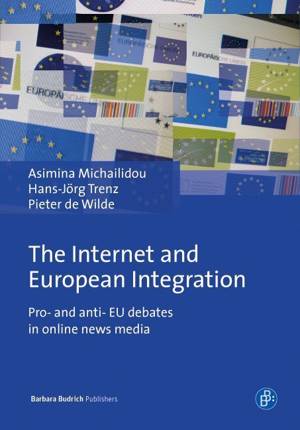
Door een staking bij bpost kan je online bestelling op dit moment iets langer onderweg zijn dan voorzien. Dringend iets nodig? Onze winkels ontvangen jou met open armen!
- Afhalen na 1 uur in een winkel met voorraad
- Gratis thuislevering in België vanaf € 30
- Ruim aanbod met 7 miljoen producten
Door een staking bij bpost kan je online bestelling op dit moment iets langer onderweg zijn dan voorzien. Dringend iets nodig? Onze winkels ontvangen jou met open armen!
- Afhalen na 1 uur in een winkel met voorraad
- Gratis thuislevering in België vanaf € 30
- Ruim aanbod met 7 miljoen producten
Zoeken
The Internet and European Integration
Pro- And Anti-Eu Debates in Online News Media
Asimina Michailidou, Pieter de Wilde, Hans J Trenz
Hardcover | Engels
€ 49,45
+ 98 punten
Omschrijving
This book offers a wealth of original empirical data on how online media shape EU contestation. Taking a public sphere perspective, the authors highlight the myths and truths about the nature of audience-driven online media content and show how public demands for legitimacy are at the heart of the much-analyzed politicization of European integration. What EU citizens most intensely debate online are the fundamental questions of what the European institutions stand for and how they can be held accountable. Drawing on innovative and rigorous analysis of online media ownership, journalistic content and online readers' inputs, the authors piece together the components of the dynamic nature of EU contestation and the degree of convergence towards Euroscepticism across EU member states in the first years of the Eurocrisis. There is no doubt that EU citizens have strong opinions about the EU and interactive online media allow these opinions to come to the fore, to be challenged and amplified both within and beyond national public spheres. Yet, for all its potential to unite European publics, online EU contestation remains firmly anchored in offline news media frames, while citizens and journalists alike struggle to put forward a clear vision of the future EU polity.
Specificaties
Betrokkenen
- Auteur(s):
- Uitgeverij:
Inhoud
- Aantal bladzijden:
- 250
- Taal:
- Engels
Eigenschappen
- Productcode (EAN):
- 9783847401537
- Verschijningsdatum:
- 19/11/2014
- Uitvoering:
- Hardcover
- Formaat:
- Genaaid
- Afmetingen:
- 148 mm x 210 mm
- Gewicht:
- 467 g

Alleen bij Standaard Boekhandel
+ 98 punten op je klantenkaart van Standaard Boekhandel
Beoordelingen
We publiceren alleen reviews die voldoen aan de voorwaarden voor reviews. Bekijk onze voorwaarden voor reviews.











